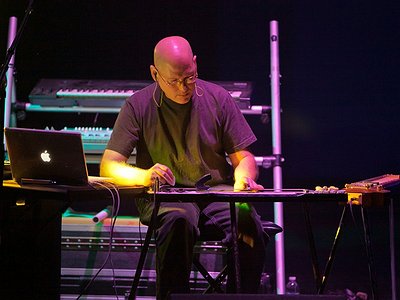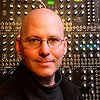Nature and yourself
Music-sharing sites and -blogs as well as a flood of releases in general are presenting both listeners and artists with challenging questions. What's your view on the value of music today? In what way does the abundance of music change our perception of it?
Perhaps we should differentiate the value of making music from the value of selling music. I try not to become one of those old grumps that dismiss the flood of new ideas as too much noise. Before we had recordings, people would learn how to play an instrument and entertain themselves and their friends. Some became professionals, and they played for kings or the church. Recordings gave us the chance to document and distribute sound. Some became professionals, and their music became a commodity.
Now the Web turns everyone into a centre of distribution, resulting in a flood of information. Is it all good? No, but the fact that people are being creative seems good to me. To be honest, I do sometimes feel that it devalues my own activity, as I try to create something that might float instead of drown in the flood. Sometimes, in order to stay creative, I have to delude myself temporarily to imagine that it matters. Later I may feel that it doesn’t matter, and that it’s pointless to work so hard on music that becomes mere fluid in a pipeline of disposable noise. Perhaps the process of staying creative justifies the end result; so if I have to delude myself, at least it keeps me busy.
How, would you say, could non-mainstream forms of music reach wider audiences?
Once music reaches a wider audience, then we start to call it mainstream, so perhaps there is a subtle contradiction in the question. For example, is Tom Waits mainstream? Is Björk mainstream? I don’t know the answer, but I think these two examples show that some very unique and uncompromising musicians can reach a wide audience. Perhaps a magical combination of right place and right time, persistence and conceptual focus, combined with a level of professionalism that made it possible for them to reach out to more people.
Usually, it is considered that it is the job of the artist to win over an audience. But listening is also an active, rather than just a passive process. How do you see the role of the listener in the musical communication process?
I think this depends upon the individual message of each artist. Some art needs to be confrontational or uncompromising, other art succeeds with seduction or satisfying an urge. I would not assume that only the confrontational art has substance, or that listeners need always to be serious in order to derive meaning from music. Often, a great communicator can sneak immense depth and meaning into a form that appeals immediately from the start. Likewise I can think of some very austere and uncompromising music that also feels devoid of content or purpose.
Clearly, the more effort listeners put into listening, the more meaning they can derive. I prefer to make music that quietly invites a listener to step inside the sound and pay more attention. For that to work, I try to seduce rather than demand attention. I want to develop a rapport and trust with the listener, giving permission to actively listen and creating a suggestion that, perhaps, there are layers of intention and structure awaiting discovery.
Reaching audiences usually involves reaching out to the press and possibly working with a PR company. What's your perspective on the promo system? In which way do music journalism and PR companies change the way music is perceived by the public?
Certainly this has changed a lot with the internet in the last decade. Personally I never had a PR company or publicist work for me, although I did benefit from the efforts of small record labels with whom I worked during the 90s, especially Hearts of Space. I think when I was starting out, press and radio had far more influence than they do today. YouTube, social networks and Google rankings matter more these days. Now it is both more immediate and more confusing. I guess I am lucky that I never expected huge fame or fortune from this odd music I make. As I started out by releasing my own albums over 30 years ago, I am comfortable with the DIY aesthetic of the Web generation.
Please recommend two artists to our readers which you feel deserve their attention.
Nature and yourself. The natural world is the most creative and prolific artist I can think of, and when we pay attention to the dynamic interplay of all the components of life, we ourselves become nourished and more creative. This creative force inspires us to make art. Therefore the second most important artist is each one of us, when we pay close attention.
A wealth of information on Robert Rich and his work can be found at his personal website robertrich.com







